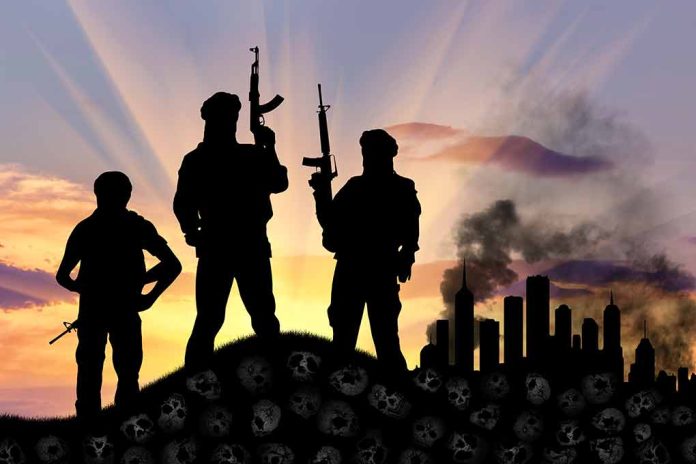
The complex chess game of geopolitical power continues to unfold as Israel counters threats from Iran-backed groups and global terrorism grows.
At a Glance
- Israel faces threats from Hamas, Hezbollah, and al-Qaeda supported by Iran.
- Iran provides crucial backing to destabilize the region while denying orchestrating direct attacks.
- Israel’s military actions aim for permanent elimination of threats but involve significant civilian casualties.
- Hezbollah’s resilience challenges Israel’s military efforts and complicates regional stability.
The Persistent Threat
Israel’s ongoing military campaign targets the eradication of threat from Hamas, a group backed by Iranian resources. Tehran’s financial support fuels the conflict, contributing to both Hamas and PIJ activities. Despite Israel’s efforts, these groups remain steadfast, either replenishing their ranks or expanding operations beyond Middle Eastern borders. Recent Hamas attacks demonstrated unprecedented coordination, hinting at external support, possibly from Iran. Such operations compel Israel to consider potential multi-faceted adversarial engagements, including the likes of Hezbollah and al-Qaeda.
Iran’s intricate strategic maneuvers exacerbate the geopolitical complexities. Iran’s leaders have suggested a “green light” scenario, indicating their calculated response to regional events, though their direct involvement remains unconfirmed. Israel’s retaliation strategy targets the core of Hezbollah’s capabilities, a faction known for its substantial weapon stockpiles despite recent military setbacks. Conflicts between Israel and Hezbollah have waned temporarily but remain volatile, likely to escalate if provoked.
Global Terrorism: An Expanding Threat
Alongside direct confrontations, the global terror threat continues to rise. The Islamic State and al-Qaida exploit regional chaos to bolster their forces, particularly amid decreased counterterrorism pressures. This expansion of militant influence underscores a significant threat to global security. Israel’s campaign against terrorist groups shares similarities with historical military efforts, such as Sri Lanka’s battle against the Tamil Tigers, where military solutions wrought substantial civilian casualties.
“Militarily, they [Hezbollah] have been significantly diminished,” says Brett Holmgren of the U.S. National Counterterrorism Center (NCTC).
The ongoing conflict could also impact the global oil markets, driving energy prices and creating economic uncertainties. Businesses globally face the ripple effects, from evaluating geopolitical risks to diversifying their portfolios for stability. Oil price fluctuations, driven by regional tensions and fears of a ground attack on Gaza, remain a pressing concern.
Implications and Responses
The United States remains vigilant, refining counterterrorism strategies to mitigate the growing threat. The escalating tensions also jeopardize U.S. foreign policy goals, including potential reconciliation between Israel and Saudi Arabia and ongoing support for Ukraine. The conflict signifies the limited scope of health-based approaches in resolving entrenched geopolitical strife, with medical infrastructure suffering greatly due to recurring violence.
“Heartbroken by the horrific terrorist attacks on Israel and the escalating conflict,” says Microsoft’s Managing Director, Satya Nadella. “My deepest condolences are with all those killed and impacted. Our focus remains on ensuring the safety of our employees and their families.”
Despite Israel’s intense military responses, Hezbollah and Hamas have not sustained crippling blows. Sustained assaults continue to diminish their operational capacities but have yet to annihilate their resistance. The anticipated threats compel global actors to reevaluate their strategic positions amidst the persistent shadow of geopolitical challenges and terrorism.








